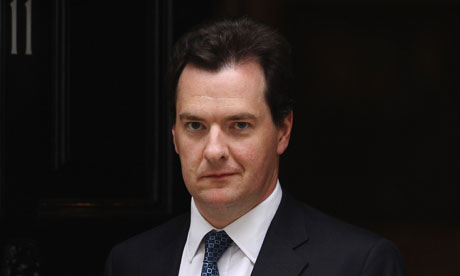European stock markets have just closed for the day, with some impressive rallies. In London the FTSE 100 ended 148 points higher at 5312, up 2.87%. In Spain and Italy, the main markets ended up over 4% higher!
We'd better wrap things up for today (busy day tomorrow, with the Autumn Statement in parliament, plus the eurogroup meeting).
Our lunchtime summary is here.
Since then, the main development this afternoon was Mervyn King's warning that Europe is slipping into another credit crunch (with UK growth also hit hard by the crisis) and Adam Posen's gloomy prediction that people will be discussing the mistakes being made today in 50 years time.
As ever, thanks to you all for reading and commenting. Good night!
Linkiesta, the Italian online newspaper, is reporting tonight that a 'six-point' plan to address the euro crisis is being drawn up -- including ECB interest rate cuts, an IMF credit line for Italy, and exempting Italy from its obligations to the enlarged European Financial Stability Facility.
The full article can be seen in Italian here, and there's a Google translation into English here.
News out of Germany this afternoon -- a parliamentary committee has just approved the new guidelines for the European Financial Stability Facility, including a model that would allow the fund's assets to be leveraged (thus giving it more firepower).
I can't find details of exactly what was approved, but this must relate to the deal agreed in Brussels in October.
This sounds like an encouraging development ahead of the eurogroup meeting tomorrow. Although, as my colleague Ian Traynor pointed out earlier, attempts to find ways to fund the enlarged EFSF appear to have failed.
Mervyn King just touched on the eurozone crisis again, during his session with the Treasury committee in parliament.
The Bank of England governor said he can see "early signs of a credit crunch" in Europe, as the region's banks continue to deleverage (leaving them with less capital to lend to each other, or to businesses)
 Adam Posen. Photograph: Graham Turner for the Guardian
Adam Posen. Photograph: Graham Turner for the Guardian
Speaking of Bank of England policymakers...while his colleagues are in parliament, Monetary Policy Committee member Adam Posen admitted that his big fear is 'stagnation'.
Speaking in New York, Posen said it was a mistake to simply worry about inflation or deflation:
It's about very large real shocks bumping the economy up and down around a relatively austere, low-growth path.
Posen also told the Council on Foreign Relations that in 50 years time, today's economic policy will be viewed in the same way the Depression era is now*.
Posen, of course, was the member of the MPC member who spent many months voting in vain for more quantitative easing, before his colleagues all saw the light last month.
* - Unnerving thought -- we could still be live-blogging this crisis in 2061....
The amount of peripheral eurozone sovereign debt bought by the European Central Bank has hit the €200bn mark.
The latest weekly bond-purchase data from the ECB shows that it spent €8.581bn through its 'securities market programme' in the last week - which was presumably mostly devoted to Italian and Spanish bonds.
That takes the total bond purchases under the programme to just over €203bn - just three months after hitting the €100bn mark.
A weekly bill of €8.5bn is broadly in line with the recent average - which some analysts have said won't be enough to keep bonds away from the danger zone for long.
Mervyn King won't be drawn on how serious the eurozone crisis could be, saying no-one can predict the scale of the shocks that may be ahead.
He points to the unbalanced nature of the world economy, with some countries running large current account surpluses and others carrying large deficits. Both creditors, and debtors, must accept some of the burden of fixing the crisis, King tells the Treasury committee.
And the deficits being carried by certain eurozone countries must be funded by "transfers, not loans", King adds.
Andrew Tyrie, chairman of the Treasury committee, kicks off by asking Mervyn King how much of the reduction in the Bank's economic forecasts is due to the eurozone crisis.
King responds that "the bulk of the downward revision since August" is due to the news coming out of the eurozone. Either because of a direct impact (lower exports to Europe), or an indirect impact (falling stock markets making consumers more cautious).
 Sir Mervyn King. Photograph: David Jones/PA
Sir Mervyn King. Photograph: David Jones/PA
Mervyn King, governor of the Bank of England, is just starting to give evidence to the parliamentary Treasury Committee -- and will doubtless be asked for his views on the eurozone crisis. You can watch it live here.
The session is a chance for MPs to ask the Bank about its recent quarterly inflation report, and is also taking evidence from Paul Fisher, Martin Weale and Ben Broadbent (all members of the Monetary Policy Committee)
Traders in the City and on Wall Street are reacting to the OECB's warning of a global slowdown, and denials of an Italian rescue package, by driving shares higher.
The Dow Jones index has jumped by 291 points, or 2.6%, in the first few minutes of trading to 11,523. In London the FTSE 100 is now up 145 points at 5310, a rise of 2.8%. In Germany, France and Italy, markets have jumped by more than 4%.
Heady times, and a welcome moves after the steady falls seen in the last couple of weeks. But what is the rally based on?
One factor is some better-than-expected retail sales data from the US, which showed a 6.6% jump in sales last Friday (known as "Black Friday", the first shopping day after Thanksgiving). Louise Cooper of BGC Partners said the figures were:
...part of a wider trend suggesting the American economy is in better shape that feared.
The financial markets also seem to be clinging to the hope that a political solution to the crisis will be found. As David Jones of IG Index explained:
Expectations surrounding Europe are driving the rally, although weekend reports that the IMF are discussing a bailout for Italy have been strongly denied by the organisation. However, there is still speculation that politicians have a newfound sense of urgency and are stepping up attempts to stem the crisis.
Speculation alone, though, shouldn't last for long. With Eurogroup ministers meeting in Brussels tomorrow, we should soon know if political progress is actually being made.
Finance ministers from across the eurozone are due to meet tomorrow night in Brussels. Ian Traynor, our Europe editor, warns that the Eurogroup gathering will probably record a "notable failure":
Ministers will be updated on October's plan to leverage the bailout fund or European Financial Stability Facility by up to a factor of five to amass a two-trillion euro war chest.
Klaus Regling, the head of the EFSF, is expected to report to the finance ministers that his recent globetrotting with a begging bowl has failed to get the Chinese or the big sovereign wealth funds to commit.
Ian reports that Brussels insiders are questioning whether the US or Canada would view any bailout for Italy benignly, following those reports (now denied) of a "€600bn bailout package." He also points out that any eurozone country requires consensus among the 17 countries before it can seek help from the IMF:
In other words eurogroup ministers could bless or block such a move tomorrow night. It's not only up to Mario Monti.Commission officials at lunchtime made plain that any such Italian gambit, even if it were true in the first place, could and probably would be vetoed.
They also heaped scorn on the reports out of Germany of secret plans for the so-called "elite bond" among the eurozone's triple-A members. The notion looks like a non-starter, incredibly divisive, doing more damage than good. Having said that, the leak of the alleged plot to the Die Welt newspaper bears all the hallmarks of German tactics consistently throughout almost two years of euro bedlam. Almost all of the big media leaks on eurozone policy have been out of Berlin, only for them to be promptly denied or dismissed by German government spokesmen.
Time for a lunchtime round-up:
• The Organisation for Economic Co-operation and Development has warned that the euro crisis could drag the world economy back into recession. The OECD predicted that the eurozone would grow by just 0.2% next year, but could shrink through 2012 and 2013 in a worst-case scenario.
• The OECD also forecast that the UK is entering recession. It predicted that the British economy would shrink by 0.1% this quarter and 0.6% in the first three months of 2012.
• Reports that Italy is negotiating a €600bn bailout have been denied. Both the International Monetary Fund and the European Commission insisted they are not in talks with Rome about a rescue
• Italy and Belgium saw their borrowing costs rise in debt auction. Both countries paid higher yields, but there was relief that the auctions were well-subscribed.
• Moody's warned that credit ratings across the EU could be cut unless the crisis is resolved. Chances of multiple sovereign defaults is "no longer negligible"
In the bond markets, yields on Belgian and Italian debt have fallen this morning after the two countries both held debt auctions (see 11.53am and 11.41am). German bond yields are up slightly, while stock markets are rallying - sending the FTSE 100 up by 104 points to 5269.
My colleague David Gow reports that there is '"much quiet rejoicing" in EU circles that the financial markets are calmer today. However, he continues:
The market's "bounce" appears to be based on two misapprehensions: that Italy will get a €600bn bailout from the IMF (which hasn't got that amount of dosh available) and France and Germany are working on a fast-track, hard-core eurozone and/or bonds...
Brussels and Washington insist that there's no such IMF deal in the offing though there has been talk on Twitter this morning of a five-point plan to rescue Italy and the euro. What might be in the wind is the notion that the ECB would lend the money to the IMF which in turn would pass it on to countries such as Italy as pre-cautionary loans - thereby avoiding overt ECB intervention (hmmmm).
The hard-core euro/six-nation Triple A bond proposal is self-defeating fantasy: the plan would never get through any EU institution so would have to be set in motion outside, thereby wrecking both the euro and the EU; why create a tight "stability" bond to guarantee the debt of the very countries you are lecturing to get their fiscal houses in order - moral hazard on a gargantuan scale.
As Helen Pidd reported this morning, the German government denied planning any such über bond this morning.
More from David:
Schäuble gave an interview on Direkt aus Berlin (ARD TV channel) last night saying the way forward is for countries to stick to the budget deficit/debt rules. He insisted this was "the right signal to convince global investors that the euro is and remains a stable currency in which it's worth investing".
That's the German line - over and over again.
Perhaps we'll know more later this week when Sarkozy and Merkel make speeches setting out their plans for December 9 - the next EU27 summit.
Another denial that Italy is about to seek an international bailout, this time from the European Commission.
EC spokesman Amadeu Altafaj told reporters in Brusslels that the Italian government had not asked for financial assistance, and that the Commisssion was not holding any talks on the issue.
This follows the report overnight that a €600bn package was being lined up for Italy (which was denied by the IMF early this morning)
Despit the denials, Italy had to accept yields of 7.3% on an auction of 12-year index-linked bonds. That's a huge jump compared with a similar auction a year ago, where the yield came in at 2.19%.
Belgium's borrowing costs have jumped this morning, in an auction of various flavours of long-term debt, totalling €2bn.
Belgium found buyers for €450m of 10-year bonds, but saw the yield (or interest rate) demanded by investors jump to 5.659% (from 4.372% at the last auction of this type). That's the highest yield paid since 2000, according to Bloomberg data.
The yields on other bonds also rose in this morning's auction. City analysts, though, were encouraged that the auction otherwise passed smoothly -- with all the bond offerings oversubscribed.
The most alarming part of the OECD's world economic report relates to Europe's debt woes. It warns that the crisis has the potential to tip the entire world economy back into recession, saying:
The euro area crisis represents the key risk to the world economy at present....A large negative event would ... most likely send the OECD area as a whole into recession.
The OECD said the European Central Bank should take immediate action to stem the crisis by expanding its bond purchasing programme (something the German government, of course, still opposes).
While the OECD predicted that the eurozone would expand by a sickly 0.2% in 2012 (begining the year with a recession), its worst-case scenario is much bleaker -- with the eurozone economy shrinking by 2.1% in 2012, and a further 3.7% in 2013.
I should also note that, despite predicting a UK recession next year (amid a worldwide slowdown), the OECD is still backing George Osborne's fiscal consolidation plans.
 OECD forecasts come a day before chancellor, George Osborne, presents the autumn statement. Photograph: Dan Kitwood/Getty Images
OECD forecasts come a day before chancellor, George Osborne, presents the autumn statement. Photograph: Dan Kitwood/Getty Images
In today's report it said that Osborne should still stick to his budget strategy unless the economy deteriorates more than expected. Were that to happen, the thinktank said the government would then be justified in softening planned public investment cuts. However, they would have to be balanced by tougher cuts in the future:
"Credibility will demand that the medium-term fiscal targets be retained and achieved, implying greater tightening later on," the OECD report said.
The OECD said that public spending cuts, falling household consumption and weak exports had all weakened the UK economy, leading to its prediction of a double-dip recession.
The OECD forecasts come just a day before chancellor George Osborne delivers the autumn statement in parliament, accompanied by economic growth forecasts from the independent Office for Budget Responsibility.
Looking at the detail of the predictions, the OECD estimates that the UK will shrink by 0.1% in the last three months of this year, and then by 0.6% in the first three months of 2012 (a recession being commonly defined as "two consecutive quarters of negative growth").
The Paris-based agency said that the Bank of England should expand its quantitative easing budget again, to £400bn (from £275bn at present).
The OECD also predicted that the UK unemployment rate will rise to 9.1% by 2013 (up from 8.3% today), leading to an increase in social problems and homelessness.
The OECD's warning that the UK is entering a double-dip recession came as it slashed its economic forecasts for all major countries.
Cutting its forecast for world economic outlook in 2012 to 3.4% in 2012 (down from an earlier forecast of 4.6%), the OECD said that the eurozone's economy is probably already contracting. It warned that....
The euro area is seen to have entered a mild recession, which will be followed by an only hesitant pick-up in activity.
... and now expects that the euro area will only grow by 0.2% in 2012. It blamed "deteriorating financial conditions" and "ongoing fiscal consolidation".
Just in – the Organisation for Economic Co-operation and Development has predicted that Britain will fall back into recession next year, and that Germany is already in recession.
In its half-yearly report, the OECD predicted that the UK economy will shrink in the current quarter, and again in the first three months of 2012. It cut its forecasts for UK growth during 2012 as a whole to just +0.5%, from +2% before.
More to follow...
 European banks are suffering a funding freeze, as the euro crisis threatens to spark a new credit crunch. Photograph: Arnd Wiegmann / Reuters/REUTERS
European banks are suffering a funding freeze, as the euro crisis threatens to spark a new credit crunch. Photograph: Arnd Wiegmann / Reuters/REUTERS
Today's newspapers offer plenty of reasons to fear that the debt crisis is about to get much worse.
Writing in the FT, Wolfgang Münchau claims that the eurozone could collapse within days, because:
Last week, the crisis reached a new qualitative stage. With the spectacular flop of the German bond auction and the alarming rise in short-term rates in Spain and Italy, the government bond market across the eurozone has ceased to function.
The front page of the Financial Times also warns that European banks are struggling to find funding, leading to a new euro-wide "credit crunch".
Data compiled by Dealogic shows a $241bn gap between the amount of money that banks must return to their lenders this year ($654bn), and the amount of new bonds they have sold during 2011 ($413bn). This, the FT says, is the first time in five years that EU banks have been unable to roll over their maturing debt.
Here's another entry for your euro-crisis dictionary: Elite-Bonds.
Helen Pidd write from Berlin that:
Elite-Bonds is the name being given to a new über bond allegedly being cooked up in secret by Germany and the other five richest countries in the eurozone. These, according to the conservative daily, Die Welt, would be issued by Germany, France, Austria, Luxembourg, the Netherlands and Finland and would be offered at interest rates of 2-2.5%. They would not only be used to buoy these six AAA (for now)-rated nations but also to help their more imperilled neighbours.
The report was quickly denied by a government spokesman in Berlin. But then... they would, wouldn't they? In public at least, Angela Merkel is still vigorously against the introduction of a eurobond which would be jointly issued by all 17 countries using the communal currency. She was furious last week when the European commission thumbed its nose at Berlin by floating the idea of "Stability Bonds" – eurobonds under a different name.
You can read the Die Welt report here (in German)
Here's an agenda of the key events today
• Italy and Belgium hold debt auctions – morning
• OECD issues report on world economic outlook – 10am GMT
• White House hosts EU-US summit – all day
• CBI distributive trade data (UK retail sales) for November – 11am GMT
• Bank of England governor Mervyn King testifies to parliament 3pm
Europe's appetite for borrowing needs constant sating – later this morning, both Italy and Belgium will hold debt auctions.
Belgium (which is reeling from the double-shock of a credit rating downgrade and the possibility of a new government) hopes to raise €2bn from a range of long-term bonds. Italy is expected to sell €750m of inflation-linked bonds.
France, Spain and the UK will also bring debt to the market this week (while Italy is also planning further bond sales). Gary Jenkins, analyst at Evolution Securities, warned that these auctions could, if they fail, shock the system. He told clients this morning that:
The success or otherwise of these auctions may determine the future of the EU.
We do seem to be moving slowly towards more of a fiscal union but at a pace that may result in all the components being put in place after a complete meltdown of the financial system…
What is going on with Italy today? Overnight, daily newspaper La Stampa reported that the International Monetary Fund was preparing a "€600bn loan for Italy".
This, the paper said, was designed to keep Italy out of the international borrowing markets while new PM Mario Monti and his cabinet of technocrats got to grips with Italy's economy and pushed through wide-ranging austerity measures.
The reports helped to sparked a rally in Asian markets overnight, pushing the Nikkei 1.5% higher. However, the IMF has denied the report in the last few minutes, with a spokesman insisting no discussions were taking place.
In truth, the story does seem implausible as the IMF doesn't have sufficient assets in place to rescue Italy (with its €1.9trn debt pile). Any package would be delivered in concert with the European Central Bank – interestingly, auditors from the ECB are due in Italy this month.
As Terry Pratt of IG Index pointed out earlier:
The scale being suggested in media reports seems to equate to far more firepower than Christine Lagarde has at her disposal - and increasing this quickly is no easy task either.
Marc Chandler of Brown Brothers Harriman & Co agreed that it would be very difficult to "leverage" the IMF's funds into a sum large enough to bail out Italy.
Despite the IMF denial, shares are rallying in Europe this morning with the FTSE 100 now up 77 points, or 1.5%, to 5241.
Italian debt is recovering a bit of ground, with the yield (interest rate) on its 10-year bonds dropping to 7.18% (from as high as 7.44% earlier).
Moody's set the agenda this morning by issuing a "Special Comment" headlined "Rising Severity of Euro Area Sovereign Crisis Threatens EU Sovereign Ratings.
Warning that the crisis has escalated in recent weeks (no argument there), Moody's said that its "positive" scenario is now that more eurozone countries are slashed to "speculative grade" (ie junk) rating. In its "negative" scenario, several countries default and crash out of the single currency union.
You can read the report here. Here are a few of the key lines:
• The probability of multiple defaults (in addition to Greece's private sector involvement programme) by euro area countries is no longer negligible. In Moody's view, the longer the liquidity crisis continues, the more rapidly the probability of defaults will continue to rise.• A series of defaults would also significantly increase the likelihood of one or more members not simply defaulting, but also leaving the euro area. Moody's believes that any multiple-exit scenario – in other words, a fragmentation of the euro – would have negative repercussions for the credit standing of all euro area and EU sovereigns [ie, any country in the European Union].
Moody's also warned that unless we see "major policy initiatives" soon, it may rethink its ratings across the eurozone, or even the wider EU. That could have negative implications for all members, possibly even AAA-nations such as the UK and Germany.
Hello, and welcome to today's rolling coverage of the eurozone debt crisis.
This morning is dominated by two issues – reports that the IMF is in talks with Italy over a rescue package, and a warning from rating agency Moody's that there is now a risk of "multiple" defaults across Europe.
The crisis appears to be swiftly heading towards a new phase, with several commentators warning this morning that the eurozone is on the brink of collapse – perhaps within a few days. Could this prompt Europe's leaders into new action?

